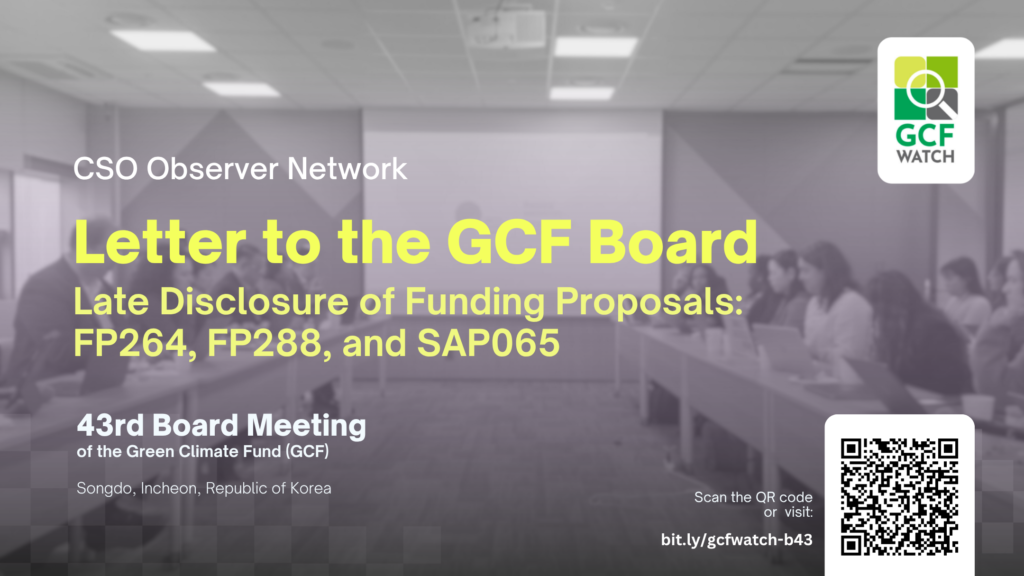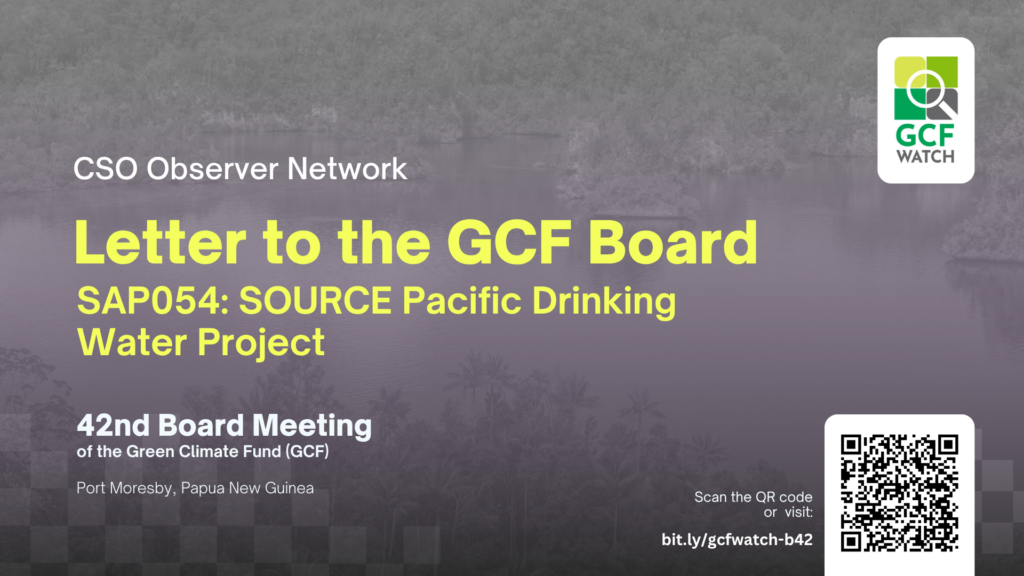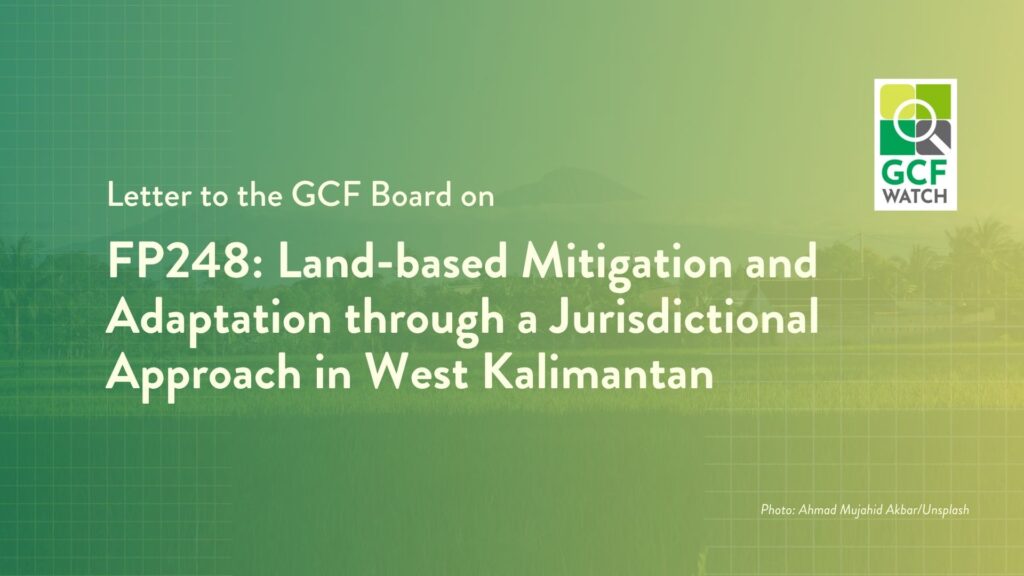CSO Update on the 35th Green Climate Fund Board Meeting – Day 2 (14 March 2023)
 From the The Asian Peoples’ Movement on Debt and Development (APMDD)
From the The Asian Peoples’ Movement on Debt and Development (APMDD)
14 March 2023
The Second Day of B35 opened with an executive session as the Board continued its discussions regarding the Selection of the new Executive Director of the GCF. Upon resumption, the co-chair announced the selection of Mafalda Duarte, who was the head of the Climate Investment Funds (CIF), as the new GCF executive director.
The announcement was immediately followed by the agenda item Report on the Activities of the Secretariat. The outgoing GCF Executive Director (ED) Yannick Glemarec presented the progress of the GCF in terms of staffing, replenishment, the funding risks of the GCF, the financial plan to address currency fluctuation, and the disbursement of funds to GCF-approved projects and activities.
The Board however raised concerns about other issues that were not mentioned in the presentation such as the Secretariat’s approach in implementing its replenishment activities and its failure to elaborate on the progress around the Updated Simplified Approval Process (SAP) for Funding proposals. Other issues raised were about the effectiveness of the Readiness Program of the GCF for countries and direct access entities (DAEs), and the longstanding issue around the imbalance between mitigation and adaptation projects.
The BM from Egypt mentioned that there needs to be clarity with the Secretariat’s approach: that developed countries, as written in the Paris Agreement, are the ones obligated to provide funds for the GCF and that the Secretariat’s efforts to “broaden the contributor base” must prioritize the delivery of contributions from developed countries. “Encouraging” developing countries to also contribute to the GCF’s second replenishment should come secondary.
As for the progress around the Updated SAP, the BM from Argentina asked the Secretariat what they have been doing to implement the update, to which the outgoing ED explained how the Secretariat aims to implement it this year, in line with the update of the GCF’s Strategic Plan (USP).
The BM from Antigua and Barbuda on the other hand, raised concerns about the Fund’s Country Programming approach and how developing countries are having difficulties abiding because it is not aligned with their Nationally Determined Contributions (NDCs) and National Adaptation Plans (NAPs). She argued that this is the reason why the readiness programs have been ineffective and why there are lower numbers of DAE access. The outgoing ED explained that the ineffectiveness of the readiness program is primarily due to the NDAs’ and DAEs’ lack of capacity, to which the BM from Antigua and Barbuda disagreed.
The issue about how mitigation projects still dominate the GCF portfolio was also raised by the Board. The outgoing ED argued that in nominal terms, the gap is not that huge – 65% Mitigation, 35% Adaptation, but developing country BMs believe the gap is still stark and argued that the Fund must strive to keep it in the 50:50 ratio based on its mandate and what is in the Governing Instrument. The Secretariat believes the right approach to address the gap is to advance pending policy updates in the Fund, such as the update of the GCF Strategic Plan.
The co-chair also called on Erika Lennon, the CSO Active Observer for Developed Countries to hear the perspectives of the CSOs. Erika raised the importance of having language translations for the key operational documents of the GCF, such as funding proposals and major policies, to stakeholders, and echoed the concerns raised by BMs around the continued lack of privileges and immunities (P&Is) by the GCF in several countries where it implements projects. The outgoing ED also thanked the civil society for relentlessly connecting with stakeholders, both governments and those in local communities in developing countries, and lauded the CSOs’ efforts to help “improve the GCF” overall.
As part of the discussion on the Report on the Activities of the Secretariat, the Board also looked into the Risk Management Framework. The outgoing ED presented the state of play of the Fund’s risks and “red flags,” which includes the direct or indirect harm that GCF projects could bring to peoples and communities of developing countries, the Fund’s exposure to currency fluctuations, and its lack of Privileges and Immunities (P&Is) in several countries where it operates. As for the currency fluctuations, the Secretariat reported that the World Bank as the Fund trustee and selected firm to provide hedging services to the GCF, is ready to implement a hedging strategy starting April 2023.
The Secretariat also shared its efforts to further develop the Fund’s Risk Management framework (RMF) by taking the risk register and dashboard online and doing consultations with the Board regarding the reconstitution of the Board Risk Management Committee.
As this agenda item is an annex under the Report on the Activities of the Secretariat, the matter was also suspended for further Board discussions.
The Board then proceeded to discuss the agenda item Guidance from COP27, which is a document that presented the actions to be undertaken by the GCF in response to the direction provided by the Conference of Parties last November 2023 at Sharm El-Sheikh, Egypt. The members of the Board mentioned various topics that they believe should be prioritized in the Board workplan. These include the advancement of the Fund’s work around enhancing the support for Results Based Payments (RBP) for the REDD+ Program, to which the BM from Norway urged the Board to continue conversations about forestry financing. He added that the topic that first came up at B33, should be revisited in the succeeding Board Meetings this year.
Other BMs were also happy to see the guidance about Fund initiatives around Just Transition and consider the GCF as a key institution capable of fully promoting and advancing just transition in developing countries. The BM from Japan noted the guidance that encourages requests for proposals related to technology incubators and accelerators. He argued that such a move will give the Fund the chance to support innovative technologies, and then requested the secretariat to prepare a timetable that will set further discussions on the said topic at the next Board Meeting.
The BM from Antigua and Barbuda also highlighted the importance of the Fund’s alignment with the Article 2.1.c. of the Paris Agreement, which is about “making finance flows consistent with a pathway towards low greenhouse gas emissions and climate-resilient development.” She asserted that working directly with Central Banks in many of the Global South regions is crucial, especially because these institutions have gained enough experience and expertise in developing financial policies.
On behalf of the Africa Group of Nations (AGN), the BM from Kenya also raised how the document was circulated late (only less than a week ago), giving them limited time to critically examine the document and consult their respective advisers and constituencies. She asserted that the guidance should also include the mandated activities for the GCF agreed at COP27, including initiatives done around Just Transition, and activities that lead to high-impact adaptation. She then moved to defer the adoption of the item to the next Board Meeting, to give the Board time to look at the proposed workplan and integrate the mandated activities suggested by the COP.
The CSO Intervention, delivered by Eileen Cunningham who is the Active Observed from developing countries, welcomed the COP guidance but cautions the Board in interpreting some of the guidance particularly on the promotion of technology incubators and accelerators that could potentially open up proposals for unproven at scale technofixes, like geoengineering, and technologies falsely perceived as “clean energy”, including biomass burning, that are actually directly harmful for the environment or indirectly harmful as they primarily serve to enable the continued reliance on fossil fuels. The CSOs also expressed concerns around the possibility of the Secretariat to extrapolate the guidance on Complementarity and Coherence to collaborate with financial instruments and mechanisms implemented by international financial institutions (e.g. MDBs and other funds outside the UNFCCC) that are designed to operate for profit and provide climate finance via debt-creating mechanisms.
The CSOs noted the Secretariat’s proposal to the Board to continue reporting on implementation of the Gender Policy, which based on how it is currently done, does not raise ambition on gender accountability, as the Secretariat reporting continues to be based solely on compliance with and production of gender documentation, not the quality and implementation of the gender assessments and gender action plans and results measurement of gender equality outcomes.
Given the objections and suggestions for deferral of the item to the next Board Meeting, the co-chairs decided to suspend the item for further consultations.
The matter was then followed by the discussions around the Consideration of Accreditation Proposals, which started with a presentation from the Secretariat about the activities and initiatives they have undertaken last year related to accreditation and re-accreditation processes. The Secretariat conducted Stage 1 assessments for 22 re-accreditation applications, assessed 7 upgrade applications from entities seeking to expand their accreditation scopes, supported 70 AEs in addressing their accreditation conditions, reviewed 110 AE institutional-level monitoring reports on continued compliance with GCF accreditation standards, assessed 140+ new applications in the pipeline, and also provided guidance to NDAs and entities as well as readiness support to NDA-nominated DAEs.
As of March 2023, the Fund has a total of 113 Accredited Entities, of which 75 have completed their Accreditation Master Agreements (AMAs). A total of 19 re-accreditation has also been approved by the Board, with 9 entitles having completed their 2nd AMAs. As for applications in the pipeline, there are a total of 147 new applicants, of which 18 are undergoing the review process of the Accreditation Panel.
When the Board was asked for overall comments from the presentation, the BM from Antigua and Barbuda raised the recurring issue of DAEs being stuck in the pipeline for years. She cited how having Privileges and Immunities (P&I) in developing countries favors the International Access Entities (IAEs) and disempowers local communities. For IAEs like the World Bank and other UN agencies, having P&Is in developing countries absolves them from national legal actions should they violate peoples rights or do harm to the communities. She then urged the Board to urgently look into how the Accreditation Process can be made easier for DAEs and the people in the Global South.
After hearing the concerns raised, the Secretariat presented the applicants for re-accreditation and new accreditation for this Board Meeting. These are the:
|
RAPL012: Caribbean Community Climate Change Center (5C) – a Direct Access Entity based in Belize seeking re-accreditation without changes to accreditation type |
Conditions for re-accreditation: delivery of Institutional Risk Management Framework/Policy, Institutional Code of Conduct, Policy for Conflict of Interest, Policy on Prohibited Practices, Institutional-level Grievance Redress Mechanism among others. |
|
|
RAPL018: InterAmerican Development Bank (IDB) – an International Access Entity based in the US seeking re-accreditation without changes to accreditation type |
Conditions for re-accreditation: none |
|
|
APL 117: The Nature Conservancy (TNC) – an International Access Entity based in the US seeking accreditation to the GCF |
Conditions for accreditation prior to the signing of AMA: Adoption of the Policy and Procedures of its institutional-level Grievance Redress Mechanism Conditions for accreditation prior to submission of first FP: Delivery of E&S risk and impacts identification report Conditions for accreditation prior to first disbursement: Delivery of E&S Monitoring Plan |
|
The co-chair then asked the Board to look at the decision line by line. When the Board looked to approve the re-accreditation of RAPL012, the BM from Antigua and Barbuda read a statement that expressed support for the re-accreditation and lauded the good track record of the applicant, but highlighted how the timing of the conditions set for the applicant’s re-accreditation, is unfair and restricting to the entity’s chance to develop its first Funding Proposal.
The BMs from Germany and Switzerland on the other hand, expressed their support for the re-accreditation of RAPL018 but suggested in the decision text a paragraph that affirms RAPL018’s efforts to align their portfolio according to the goals of the GCF.
When the Board looked into the decision about the accreditation of APL117, the BM from Antigua and Barbida strongly expressed her opposition. She said based on experience in their country, The Nature Conservancy (TNC) is far from how it was described in its application, and its accreditation will create a major reputational risk for the Fund. She moved that the application be rejected by the Board, prompting the co-chair to suspend the agenda item for further consultations with concerned Board Members.
Other agenda items that were opened in Day 2 included the Reports of the Independent Units, to which the Board noted without objections, and the Consideration of Report C-0006 of the Independent Redress Mechanism (IRM). As the latter was deemed to be a confidential matter by the Board, they decided to discuss it in an executive session until the end of Day 2. C-0006 is a case concerning FP146: Bio-CLIMA: Integrated climate action to reduce deforestation and strengthen resilience in BOSAWÁS and Rio San Juan Biospheres. This project is proposed by the Central American Bank for Economic Integration (CABEI). Land ownership, project due diligence, cultural heritage, free, prior, and informed consent, indigenous peoples’ rights, and environmental damages are areas of concerns raised against the project and the accredited entity.
You can catch GCF B35 via webcast and on demand here: https://www.greenclimate.fund/








